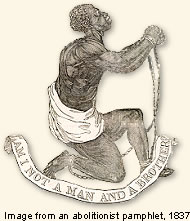James Somerset
James Somerset (also Somersett ) was an African slave who became known through a lawsuit in the highest court in England demanding his freedom.
Life
Somerset was by a certain Charles Stuart in 1749 at a young age in Virginia ( British America acquired). Stuart was an English government employee and in this capacity traveled to England in 1769 with Somerset, who at that time had no first name. There Somerset came into contact with members of the English anti-slavery movement , including the well-known activist Granville Sharp . He was also baptized as a Christian during this time.
Somerset fled in 1771. His owner offered a reward and he was caught. Stuart put Somerset on a ship bound for Jamaica , where Somerset was to be sold. His godparents found out about his situation, went to court, citing the Habeas Corpus document, and got the captain of the Jamaican driver to hand it over to Somerset.
Public opinion was largely against slavery and the time was ripe for a decision on whether or not slavery was permissible in England. Somerset sued Stuart for release in the King's Bench , England's highest court. He was supported by anti-slavery activists. Stuart, in turn, was supported by planters from the West Indies who had a self-interest in the continued existence of slavery.
On June 22, 1772, Lord Mansfield pronounced the judgment of the Tribunal: Release of James Somerset, as the institution of slavery was neither morally nor politically justifiable and was never allowed by law:
“The state of slavery is of such a nature, that it is incapable of being introduced on any reasons, moral or political; but only positive law, which preserves its force long after the reasons, occasion, and time itself from whence it was created, is erased from memory: it's so odious, that nothing can be suffered to support it, but positive law. Whatever inconveniences, therefore, may follow from a decision, I cannot say this case is allowed or approved by the law of England; and therefore the black must be discharged. "
“The state of slavery is such that it appears unsuitable to be introduced for any moral or political reason; this can only happen through the positive law, which retains its effect long after the reasons, causes, and time themselves which created it have been torn from memory. This reason is so hateful today that nothing but the positive law can be used as an excuse. So whatever disadvantages result from the decision: I cannot say that this case is permitted or justified under the law of England - the black man must therefore be freed. "
This made slavery illegal in England itself. That is why no law abolishing slavery was ever passed in Great Britain. Slavery in other parts of the British Empire and the participation of British citizens in the slave trade remained unaffected and lasted until 1807 when the British Parliament decided to combat the slave trade. The abolition of slavery in all parts of the Empire did not take place until 1833.
literature
- Alfred W. Blumrosen, Ruth G. Blumrosen: Slave nation - How Slavery United the Colonies and Sparked the American Revolution . Sourcebooks, 2005. books.google ( limited preview in Google Book Search)
- Steven M. Wise: Though the Heavens May Fall - The Landmark Trial That Led to the End of Human Slavery . Perseus Books, Cambridge, MA, 2005.
- Dominik Nagl: No Part of the Mother Country, but Distinct Dominions Legal Transfer, State Building and Governance in England, Massachusetts and South Carolina, 1630–1769. LIT, Berlin 2013, pp. 637ff., ISBN 978-3-643-11817-2 . On-line
Web links
- The Newsworthy Somerset Case (English)
- Stefan Stegner: Lord Mansfield's decision in Somerset's case - beginning of the end of slavery in the British Empire? , in: forum historiae iuris, article from November 1, 2012.
Individual evidence
- ↑ Great Britain. Court of King's Bench: Reports of Cases Adjudged in the Court of King's Bench. J. Moore, 1790, p. 76 ( limited preview in Google book search).
- ↑ The slave system in the United States of North America . In: Our time. Jahrbuch zum Conversations-Lexikon , Volume 6. FA Brockhaus 1862, p. 39 books.google ( limited preview in the Google book search)
| personal data | |
|---|---|
| SURNAME | Somerset, James |
| ALTERNATIVE NAMES | Somersett, James |
| BRIEF DESCRIPTION | african slave |
| DATE OF BIRTH | between 1700 and 1750 |
| DATE OF DEATH | after 1771 |
